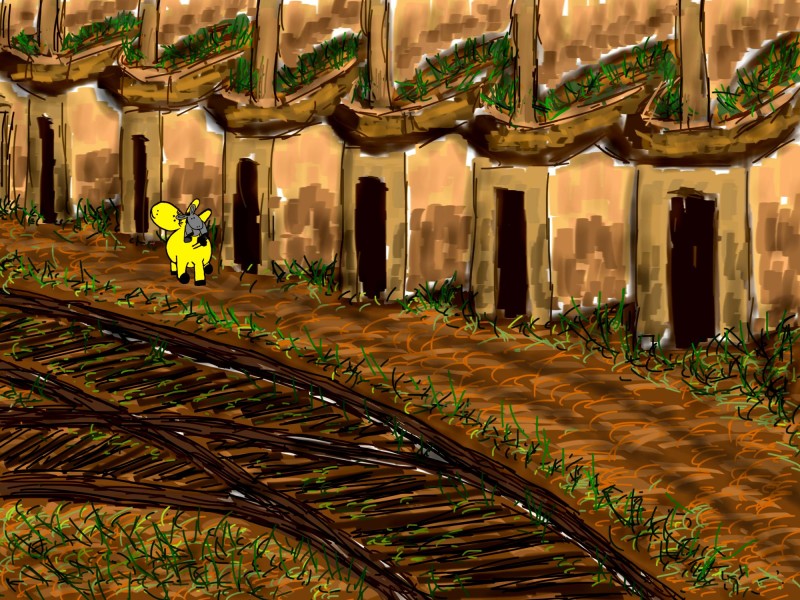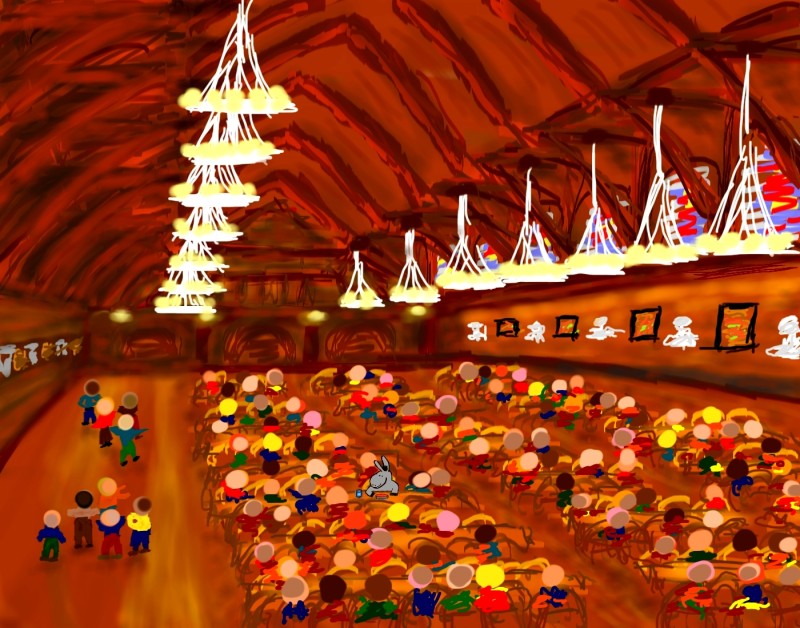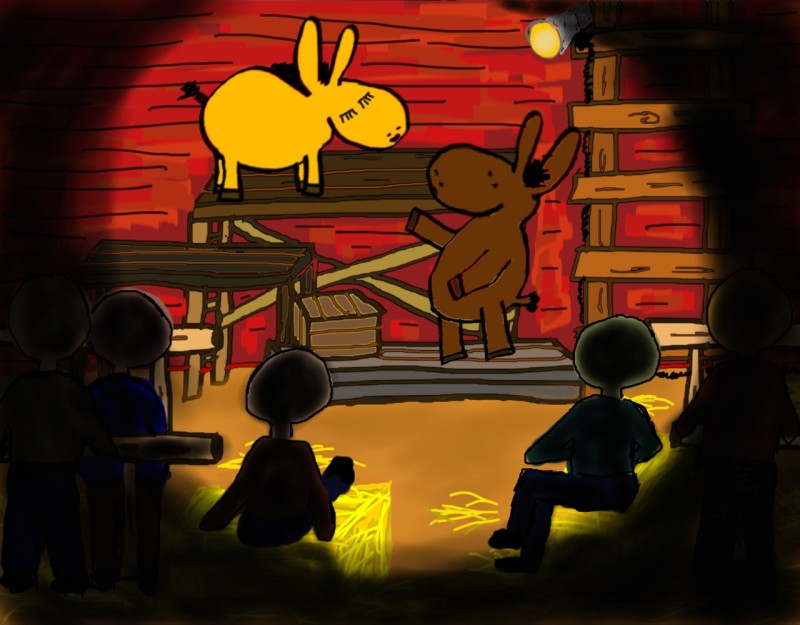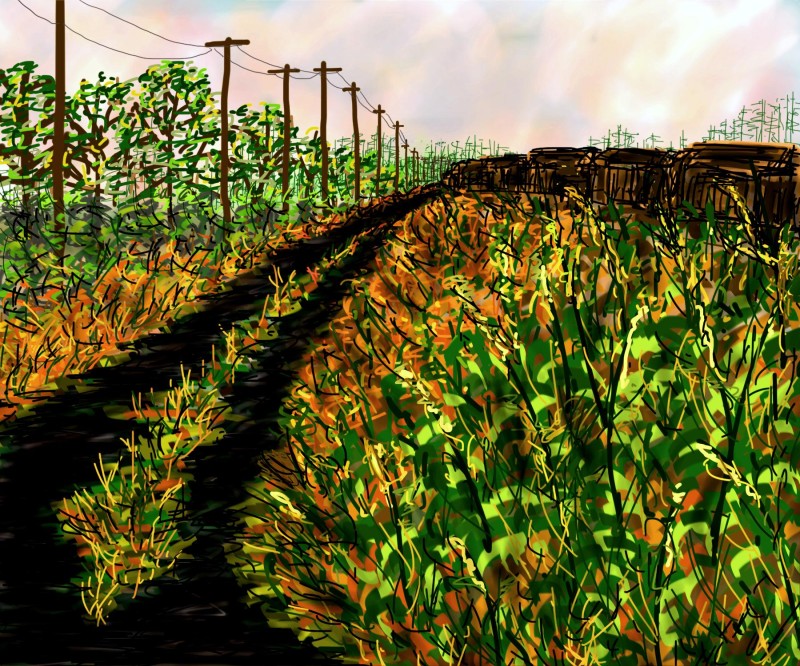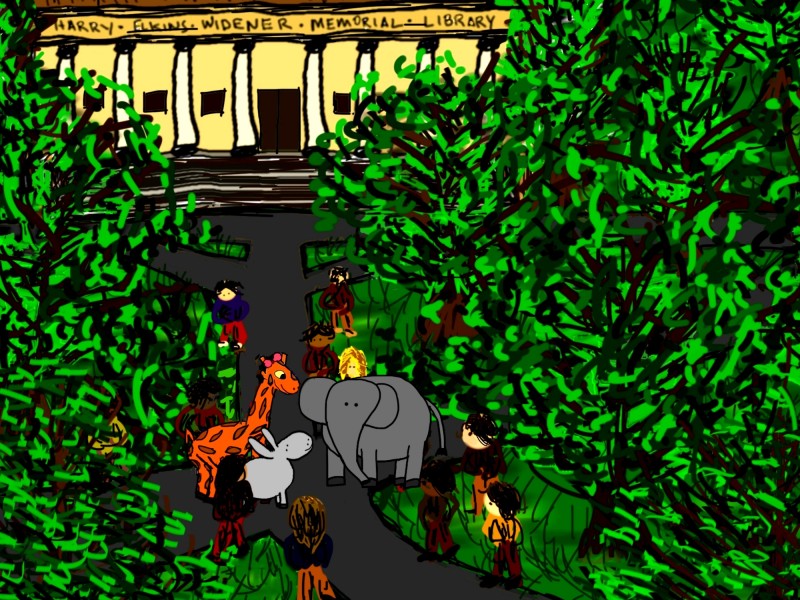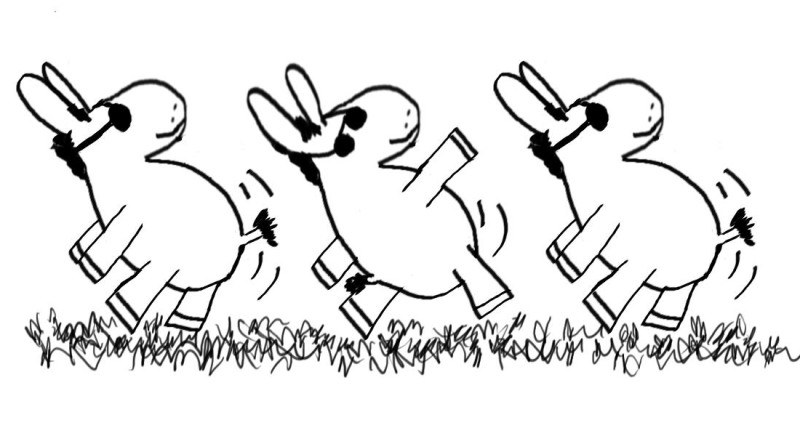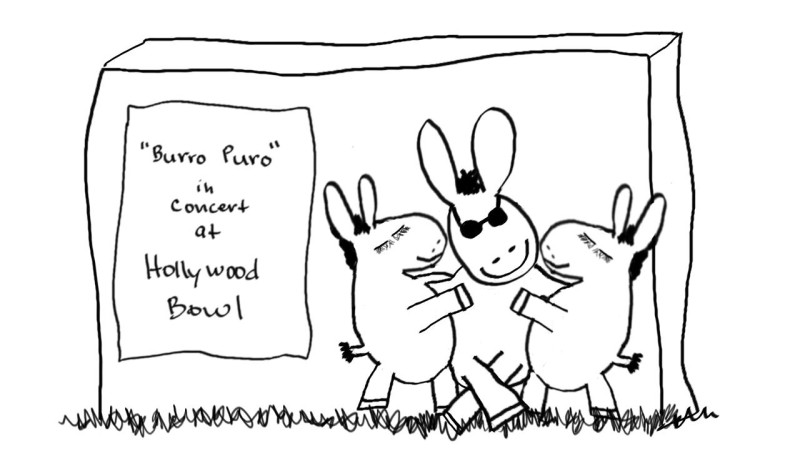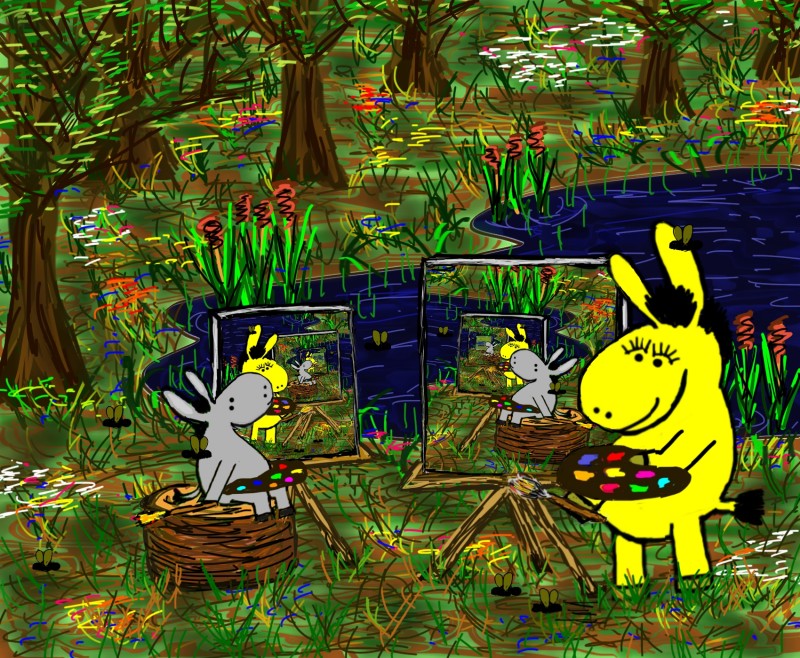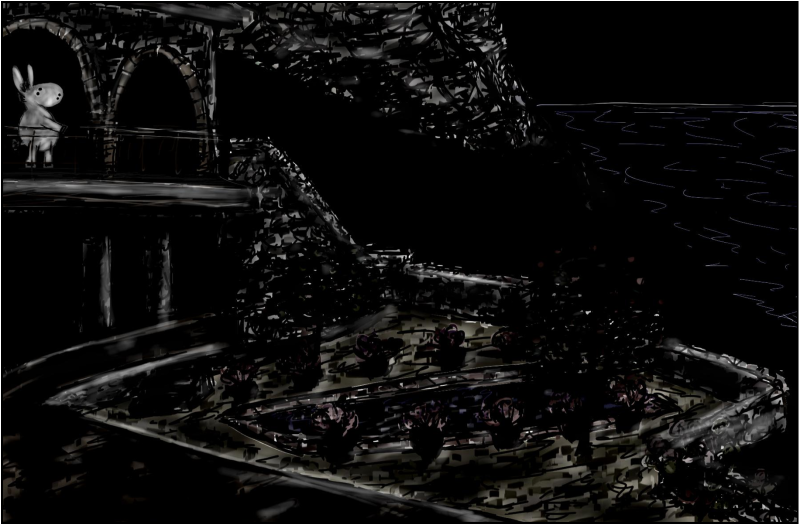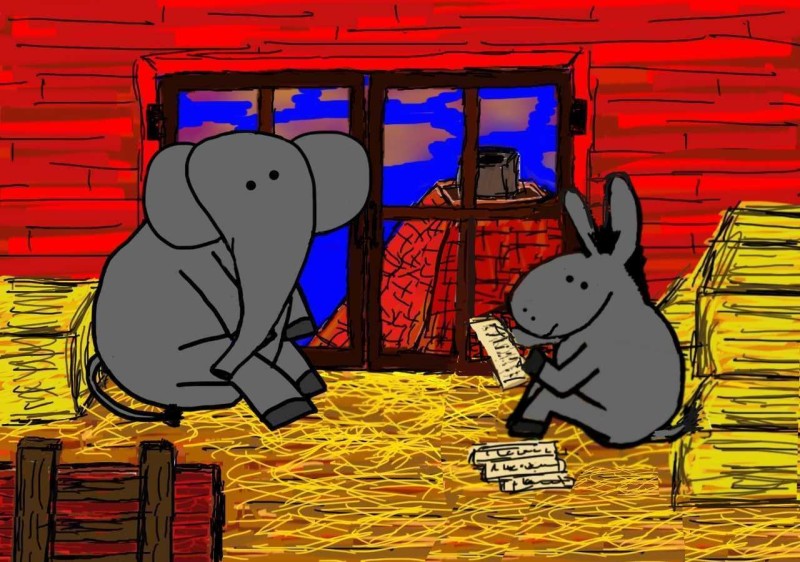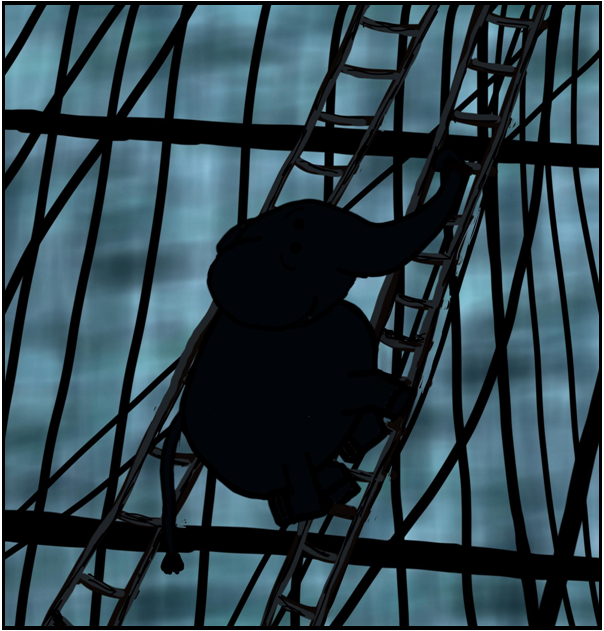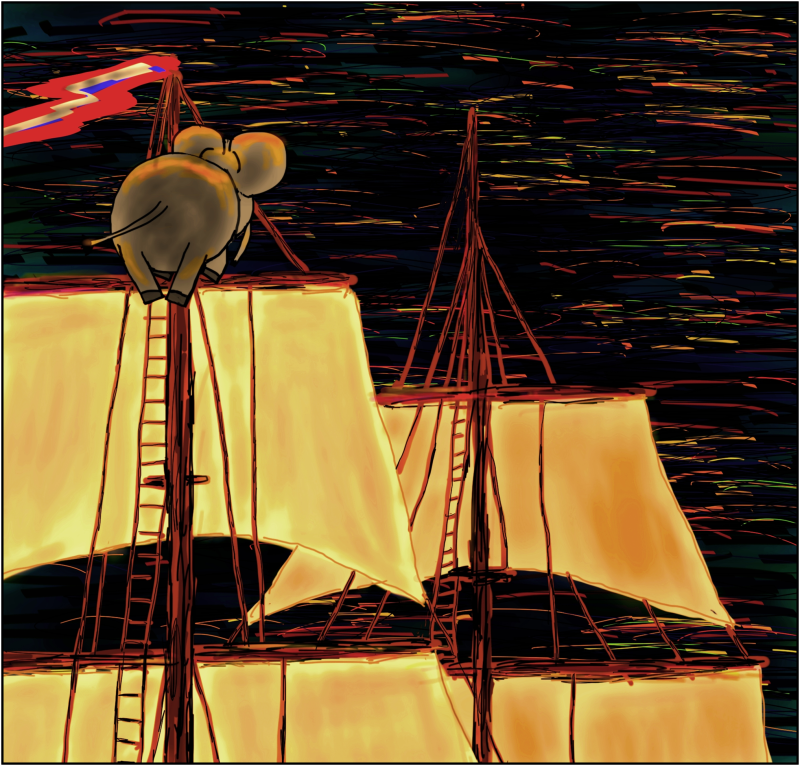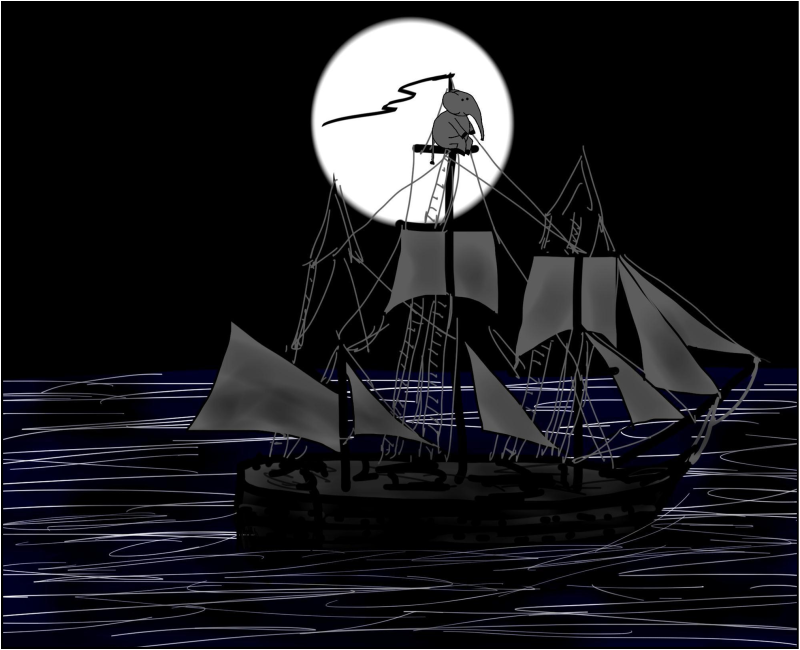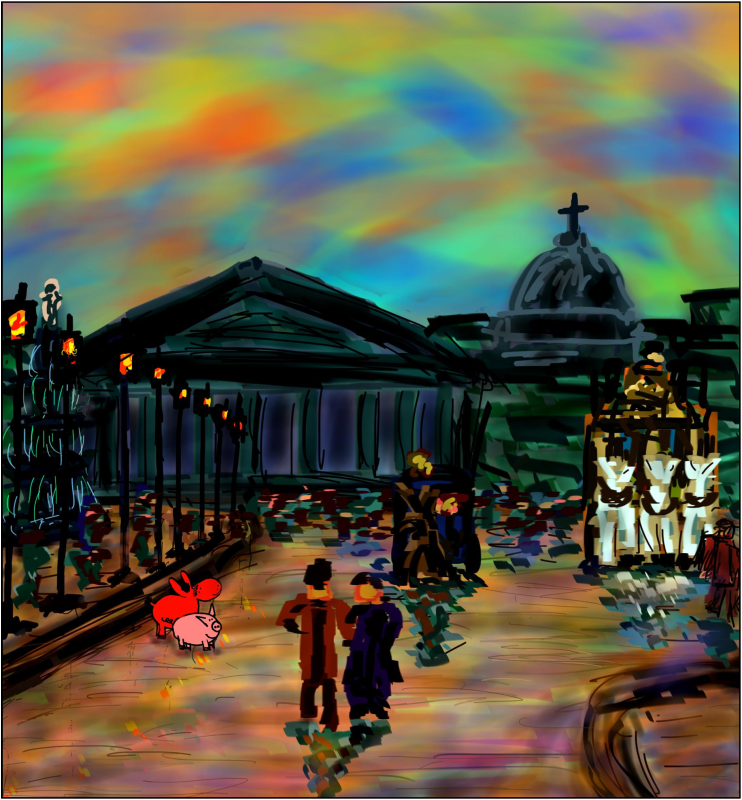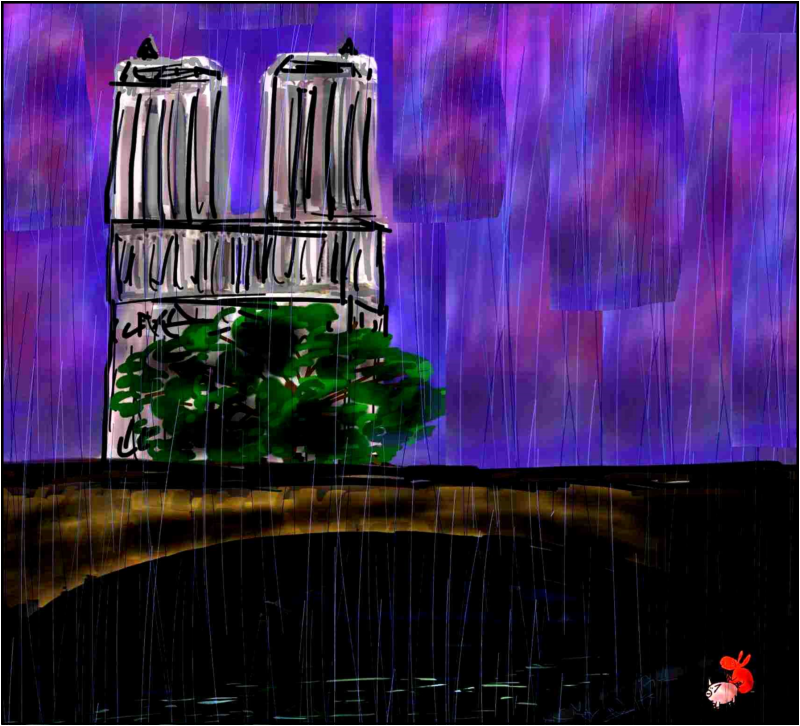Roger Miller? said Bonny. Yes, I’ve heard of him.
Tag: paintings
“Blurtso considers the stress of Harvard”
“Pablo does Pablomeo”
She brays!
Oh, bray again, bright angel!
Pablómeo, Pablómeo,
wherefore art thou Pablómeo?
Pablómeo sayest thee?
By such a name am I not that what I am…
but wouldst Pablo become Pablómeo…
if such be thine demand…
pale past be gone, faint future damned…
for thee this present present,
that be that I am!
My rose, my sun, my Pablómeo…
my faithful heart that beats,
a burro that’s called a burro,
by another name smells as sweet…
“Bonny and Ditto share some quality time” (XIII)
“Harlan becomes the center of attention”
“Blurtso raps”
Blurtso comes… Blurtso goes…
you can see him coming…
when you see his nose…
Blurtso comes… Blurtso goes…
he’s one with nature…
he wears no clothes…
Blurtso comes… Blurtso goes…
cloven-hoofed, dulce-toothed…
suave-duro, burro-puro…
Blurtso comes… Blurtso goes…
everything he thinks, everybody knows…
backward… forward…
take an inch… take a mile…
everything he does, does it with a smile…
Blurtso comes… Blurtso goes…
papi-fresco, don-juan-es-co…
Blurtso comes… Blurtso goes…
everything he thinks, everybody knows…
backward… forward…
take an inch… take a mile…
everything he does, does it with a smile…
Blurtso comes… Blurtso goes…
coming… going…
you’ll know it by his nose…
Blurtso comes… Blurtso goes…
burro-puro, suave-duro…
poco inocente, muy maduro…
Blurtso comes… Blurtso goes…
Blurtso comes… Blurtso goes…
Blurtso comes… Blurtso goes…
everything he thinks, everybody knows…
“Bonny and Ditto share some quality time” (XII)
“Blurtseau Lundif – Corsaire Extraordinaire” (XII)
“Another day,” thought Blurtseau, “and another night. The king is dead, and those who killed the king are dead, and Napoleon consolidates his power while those who would kill him wait in the wings. And the once-full moon that illuminated my vainglorious victory now wanes with a warbling light. Tomorrow the fighting will begin anew, the British, French, Spanish, Dutch, German, Italian, Sardinian, Greek generals… and all the world spins with the bones of the living and the bones of the dead, so many dead, those who pursued a borrowed or inherited dream, white bones in the soil, white bones in the surf of the sea, bones as white as the flickering tail of the waning moon, sparking and submerging among the breakers, flickering water reflection of fleeting sun echoed upon half-eaten moon, half-eaten moon half-eclipsed by the globe it now reflects down upon… half-eaten glow that grows dimmer each day… until the moon, the day, the night, and all our blood-urgent exploits fall dark upon the darkness of the sea, and vanish in the low laving sound of the waves eating the rocks with their dance of disintegration.
“And when the moon goes black, the stars will mark my path to Montecristo where Echo, alone on her island, watches the same silver flicker on a different surface of the same sea. And the light that flickered in her heart? Has it fallen prey to the same dance of deterioration? Will I find the moon already extinguished in the sea of her breast? Eclipsed by the vainglorious sphere that was my haste to depart? The misguided course of this star-crossed corsaire pursuing a sinking star? Yesterday’s hero is the dark side of the earth facing the dark side of the moon, is darkness double, two-faced night’s faceless faces, an echo of existence which touches no ear, a shout across an infinite expanse, an unreciprocated smile, a source without destination, a word from the heart that never arrives.”
“My heart is an echo of the disintegration
of the heart of the universe
that penetrates and disintegrates my own heart.”
“Blurtseau Lundif – Corsaire Extraordinaire” (XI)
At this point we meet a British sea captain named Alecs of York, and an elephant named Arlan de Borneo. An elephant? said Harlan. Yes, said Blurtso.
As he returned to his post, Arlan considered the life he had led and the peril that lay in the offing. Dr. Arlan de Borneo had run a successful medical practice in Dover until the unlucky day he botched a routine tonsillectomy on the town constable, rendering him aphonic for life. As a result his practice faltered, and he was forced to seek employment at sea. The ships sailing under Captain Alecs of York had a long-standing reputation for being the most casualty-ridden in the fleet, and as a result the captain struggled to find physicians for his ship.
With no other options, Arlan accepted a post on the Manhattan, but because of his inordinate size and the limited crew that could subsequently be housed, he was obliged to perform the duties of a dozen men. Fortunately, it was a charge he was able to fulfill, for he could effortlessly clasp a line and pull with the force of twenty hands, and could labor for days without sleep. Although he was, by nature, a gentle soul, it was clear that if he were ever roused to anger, he would wreak more havoc than a regiment of Her Majesty’s finest.
Aboard the Manhattan he was given the store room at the stern of the middle deck in which to sleep, but as he rarely slept, the space soon became a game room in which he and Captain Alecs passed slow hours in contests of two-king chess. The contests pleased and frustrated Lord Alecs, for he had never encountered a player whose skill rivaled his own, and though he won more than he lost, it seemed that luck played an inordinate role in his victories. Arlan enjoyed the matches as well, though for different reasons. It had only taken him a few games to unmask his Captain’s strategy, a strategy based on aggression, in which Alecs was willing to sacrifice any number of pieces if the maneuver brought an element of surprise and led to the rapid and dazzling defeat of his opponent. Once Arlan understood this, he was never surprised again, and from then on he was forced to lose matches on purpose to keep the tally leaning in the Captain’s favor. The same aggressive maneuvers, Arlan understood, might be equally effective at sea, but only if Lord Alecs was unknown to the enemy. An astute commander who had engaged him before, and survived his first attacks, could redirect the aggression back to its source, and so, as the reputation of Lord Alecs and his tactics became better and better known, his career moved more swiftly to its end.
With all this in mind, Dr. Arlan de Borneo was not the least surprised when the Manhattan sailed directly past L’Isle d’If and straight toward the mouth of the Marseilles harbor, where it attacked the first ship it encountered, hoping to capture a crew member who would know the whereabouts of Blurtseau Lundif.
“Aaarrgghh!!!” growled Alecs. “Sixteen sheets to the wind!!!
Into the devil’s kiln!!”
“Blurtseau Lundif – Corsaire Extraordinaire” (X)
At this point in the novel, said Blurtso, Echo has left her island to go in search of Blurtseau. After meeting a pig named Winston in England, the two cross the channel to France and make their way to Paris…
As Winston and Echo made their way through the streets of Paris, they began to feel more and more uneasy. They had never imagined there were so many people in the world. Everywhere they turned, they saw larger and larger crowds, parades of feet hurrying to some urgent destination, and every one of them was speaking a language neither Echo nor Winston could understand. The only word they knew was the name of the town where Blurtseau had lived, Roquebrune. And so, hoping someone might recognize the town and point them in the proper direction, they stood on a corner repeating that single word, “Roquebrune? Roquebrune? Roquebrune?”
Of course, it was highly unlikely that any of the passersby would recognize the name of a town of 500 inhabitants, 400 kilometers to the south; a principality that had just become a part of France. As a result, Echo’s and Winston’s inquiries elicited nothing more than puzzled looks and an occasional hungry glance, a glance that made Winston tremble, remembering his nightmarish experience in the Butcher’s Shop. Echo, too, was frightened by the things she saw, and by the din of sounds that thundered in her ears. She looked to Winston for courage, and though her friend was as panicked as she, his innate sense of self-importance, and belief he knew everything, enabled him to move confidently forward, repeating with every stride, “Roquebrune? Roquebrune? Roquebrune?”
By the end of their first day, Echo and Winston were exhausted and hungry. Though they had passed shops selling all types of food, and humans constantly engaged in the act of eating—even while they walked—Echo and Winston had not stumbled across a single discarded crumb until they chanced upon a plaza where a farmer’s market was being disassembled. They stuffed themselves with carrot tops and brown lettuce until they were full, and when it began to rain they walked down to a wide green river and took shelter under an enormous stone bridge.
